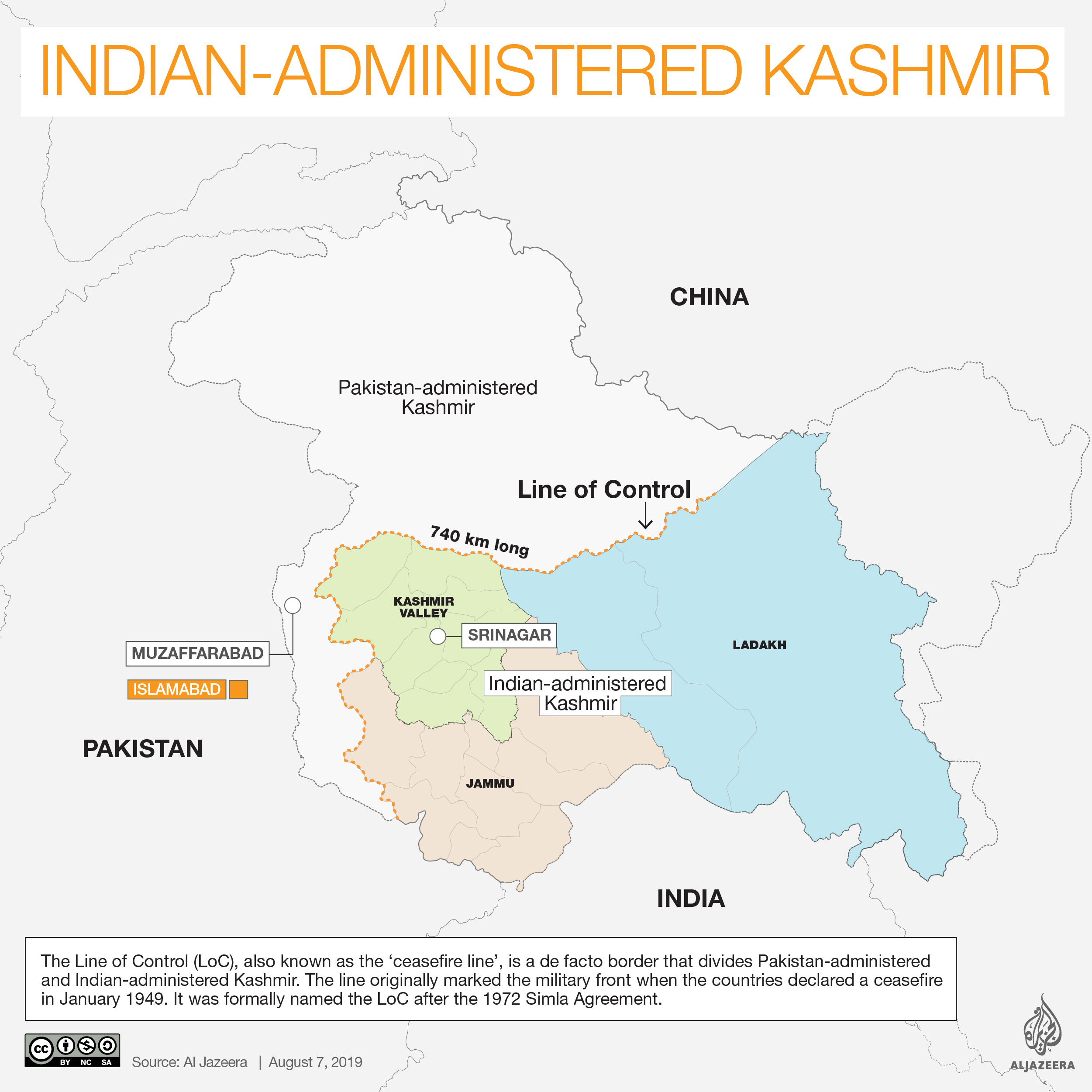Home » Middle East »
Pakistan to downgrade ties with India over Kashmir move
Islamabad says it will also suspend trade with India and take up New Delhi’s Kashmir move at the UN Security Council.
Pakistan has announced it will “downgrade” diplomatic relations with India, expel the Indian ambassaor and suspend bilateral trade after New Delhi stripped its portion of the contested Kashmir region of special status.
The decision on Wednesday was made at a meeting of Pakistan’s National Security Committee, chaired by Prime Minister Imran Khan and attended by the heads of the armed forces and senior government officials.
Shah Mehmood Qureshi, Pakistan’s foreign minister, said Islamabad will expel India’s ambassador Ajay Bisaria. Moin-ul-Haq, Pakistan’s newly appointed ambassador to India, had yet to take up his post but will now not move to New Delhi, Qureshi added in televised comments.
There was no immediate comment from India’s foreign ministry.
The Indian government said on Monday it was scrapping a constitutional provision that had allowed Indian-administered Kashmir – the country’s only Muslim-majority state – to make its own laws, in a move risking escalating already-heightened tensions with Pakistan.
Both India and Pakistan claim the region in full, but have ruled it in part since independence from Britain in 1947. The nuclear-armed neighbours fought two of their three wars over the contested territory. And Indian forces have been engaged in a 30-year conflict with rebels in Indian-administered Kashmir who want independence or a merger with Pakistan.
In a statement posted on Twitter on Wednesday, the Pakistani government said it will downgrade diplomatic ties with India, suspend bilateral trade and review bilateral agreements in protest against the “unilateral” and “illegal” actions of the Indian government in Kashmir.
Islamabad will also raise the issue with the United Nations Security Council, the statement said.
Khan, meanwhile, directed Pakistan’s armed forces to “continue vigilance”.
General Qamar Javed Bajwa, Pakistan’s army chief, on Tuesday said the country’s military firmly stands by the people of Kashmir and will “go to any extent to fulfil our obligations in this regard”.
New Delhi revoked Indian-administered Kashmir’s special status, saying it had hindered the territory’s economic development. That status, granted under Article 370 of India’s constitution, gave the region the right to its own constitution and decision-making process for all matters except defence, communications and foreign affairs. It also denied property rights in the territory to outsiders.
Revoking Article 370 was a campaign pledge of the ruling Hindu-nationalist Bharatiya Janata Party (BJP), which won a landslide re-election victory in May.
Before the controversial move, Prime Minister Narendra Modi’s government deployed thousands of troops to the heavily militarised region and imposed a communications blackout in Kashmir.
Streets in the main city of Srinagar were deserted for a third day on Wednesday, with almost all shops shut, barring some pharmacies. Armed federal police manned mobile checkpoints across the city, limiting people’s movement.
Despite the paralysing security lockdown, residents of Srinagar reported sporadic protests.
“These [protests] are mostly localised because of the heavy troop deployment,” a police officer who sought anonymity told Reuters news agency, adding that police used tear gas and pepper spray to scatter the protesters.
A police official told the AFP news agency on Wednesday that a protester died after being chased by the police. He died after jumping into the Jhelum river, the official said.
Citing another anonymous source, AFP also said at least six people have been admitted to hospital in Srinagar with gunshot wounds and other injuries from protests.
Al Jazeera’s Osama Bin Javaid, reporting from Muzaffarabad in Pakistan-administered Kashmir, said families in the Pakistan side were anxious for news from relatives on the Indian-administered side.
“We’ve been speaking to families all day today who’ve been telling us that it is very difficult for them to try and get a word out of the valley as internet, phone and other means of communications continue to be blocked,” he said.
Source: Read Full Article




